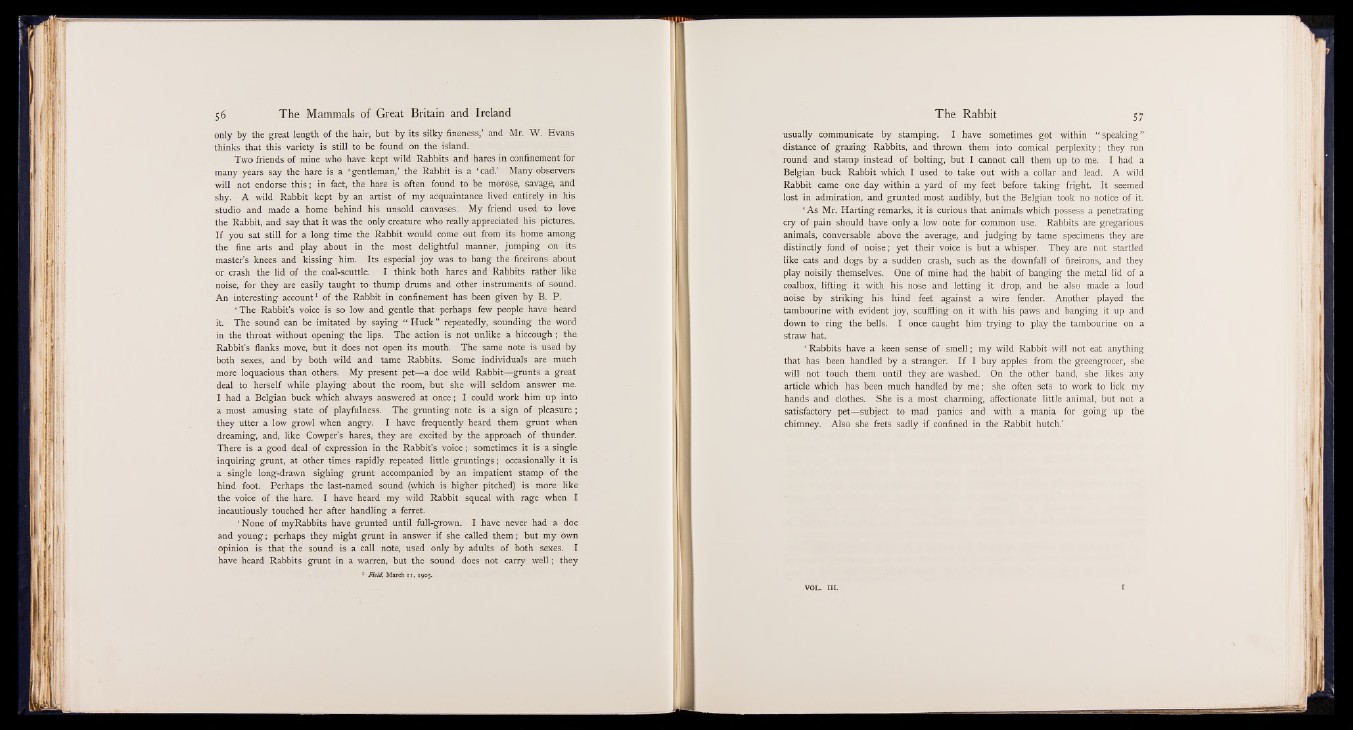
56
only by the great length of the hair, but by its silky fineness,’ and Mr. W. Evans
thinks that this variety is still to be found on the island.
Two friends of mine who have kept wild Rabbits and hares in confinement for
many years say the hare is a ‘ gentleman,’ the Rabbit is a ‘ cad.’ Many observers
will not endorse this; in fact, the hare is often found to be morose, savage, and
shy. A wild Rabbit kept by an artist of my acquaintance lived entirely in his
studio and made a home behind his unsold canvases. My friend used to love
the Rabbit, and say that it was the only creature who really appreciated his pictures.
If you sat still for a long time the Rabbit would come out from its home among
the fine arts and play about in the most delightful manner, jumping on its
master’s knees and kissing him. Its especial joy was to bang the fireirons about
or crash the lid of the coal-scuttle. I think both hares and Rabbits rather like
noise, for they are easily taught to thump drums and other instruments of sound.
An interesting account1 of the Rabbit in confinement has been given by B. P.
‘ The Rabbit’s voice is so low and gentle that perhaps few people have heard
it. The sound can be imitated by saying “ Huck ” repeatedly, sounding the word
in the throat without opening the lips. The action is not unlike a hiccough; the
Rabbit’s flanks move, but it does not open its mouth. The same note is used by
both sexes, and by both wild and tame Rabbits. Some individuals are much
more loquacious than others. My present pet— a doe wild Rabbit— grunts a great
deal to herself while playing about the room, but she will seldom answer me.
I had a Belgian buck which always answered at once; I could work him up into
a most amusing state of playfulness. The grunting note is a sign of pleasure;
they utter a low growl when angry. I have frequently heard them grunt when
dreaming, and, like Cowper’s hares, they are excited by the approach of thunder.
There is a good deal of expression in the Rabbit’s voice; sometimes it is a single
inquiring grunt, at other times rapidly repeated little gruntings; occasionally it is
a single long-drawn sighing grunt accompanied by an impatient stamp of the
hind foot. Perhaps the last-named sound (which is higher pitched) is more like
the voice of the hare. I have heard my wild Rabbit squeal with rage when I
incautiously touched her after handling a ferret.
| None of my Rabbits have grunted until full-grown. I have never had a doe
and young; perhaps they might grunt in answer if she called them; but my own
opinion is that the sound is a call note, used only by adults of both sexes. I
have heard Rabbits grunt in a warren, but the sound does not carry well|ffthey
1 Field, March n , 1905.
usually communicate by stamping. I have sometimes got within “ speaking”
distance of grazing Rabbits, and thrown them into comical perplexity; they run
round and stamp instead of bolting, but I cannot call them up to me. I had a
Belgian buck Rabbit which I used to take out with a collar and lead. A wild
Rabbit came one day within a yard of my feet before taking fright. It seemed
lost in admiration, and grunted most audibly, but the Belgian took no notice of it.
‘ As Mr. Harting remarks, it is curious that animals which possess a penetrating
cry of pain should have only a low note for common use. Rabbits are gregarious
animals, conversable above the average, and judging by tame specimens they are
distinctly fond of noise; yet their voice is but a whisper. They are not startled
like cats and dogs by a sudden crash, such as the downfall of fireirons, and they
play noisily themselves. One of mine had the habit of banging the metal lid of a
coalbox, lifting it with his nose and letting it drop, and he also made a loud
noise by striking his hind feet against a wire fender. Another played the
tambourine with evident joy, scuffling on it with his paws and banging it up and
down to ring the bells. I once caught him trying to play the tambourine on a
straw hat.
‘ Rabbits have a keen sense of smell; my wild Rabbit will not eat anything
that has been handled by a stranger. I f I buy apples from the greengrocer, she
will not touch them until they are washed. On the other hand, she likes any
article which has been much handled by me; she often sets to work to lick my
hands and clothes. She is a most charming, affectionate little animal, but not a
satisfactory pet— subject to mad panics and with a mania for going up the
chimney. Also she frets sadly if confined in the Rabbit hutch.’
VOL. III.